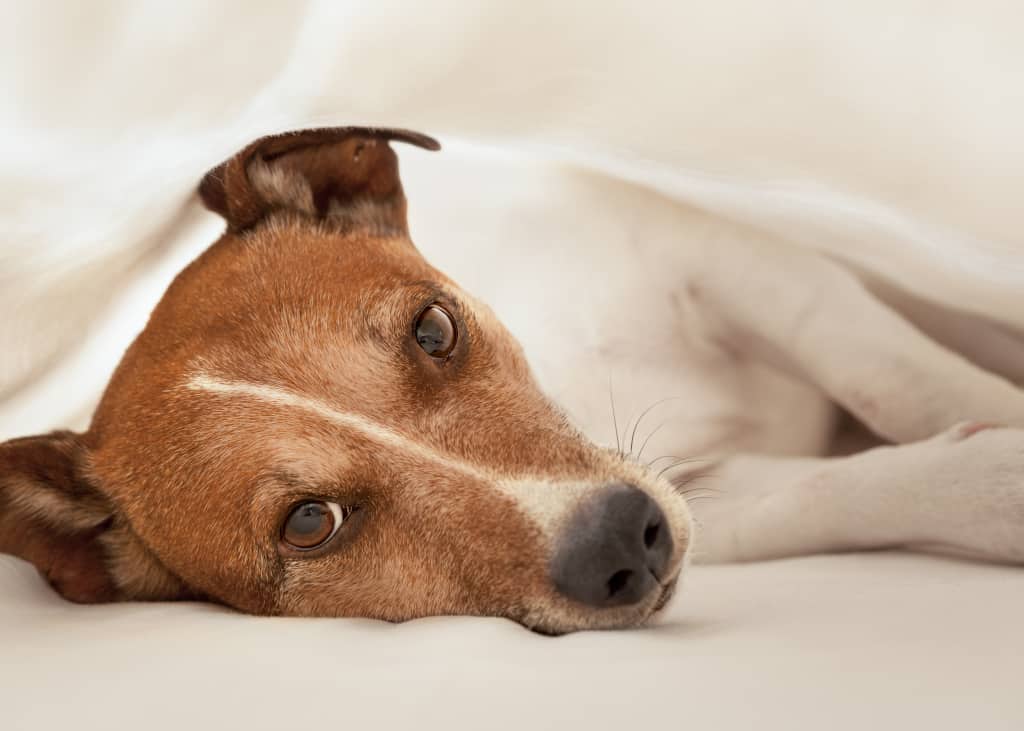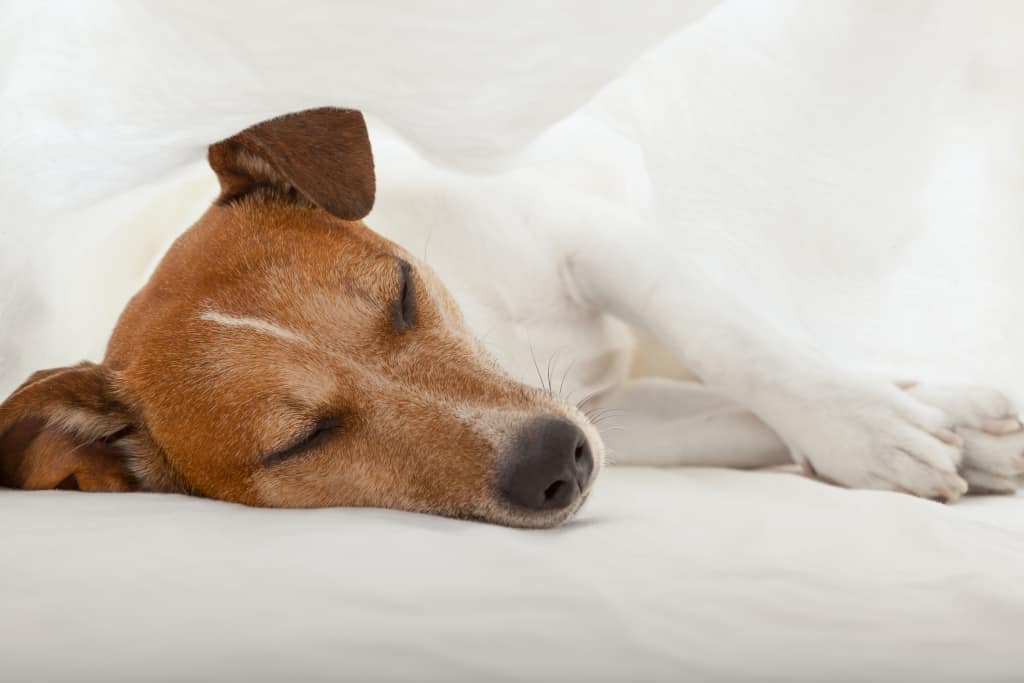Dogs are some of the most loyal and loving animals that we know. They will always be there for you through thick and thin, and they will never judge you. However, dogs sometimes can be a handful at night, in which they will refuse to sleep! That can be frustrating because, as humans, it’s natural to want your pet to be tired too so they can get some much-needed rest.
In this article, you will learn some of the possible causes of why dogs won’t doze off at night and what you can do to fix the problem!
Reasons Why Your Dog is Restless at Night and Solutions to Their Sleeping Problems

1. Pain
Is your dog restless at night all of sudden and barks? Do they repeatedly lick part of their body? Do they pant, whine, and refuse to move? And does your dog show signs of discomfort when you touch their paws, legs, or hips?
If so, it could be that they’re in severe pain and are trying to communicate this to you. The pain can stem from several different things, such as arthritis, hip dysplasia, and whatnot. That also means it’s time for a vet visit!
Dogs with arthritis will have increased restless nights because of the discomfort caused by the inflammation in their joints. Your veterinarian can prescribe medication to help alleviate some of your pup’s symptoms, as well as offer other solutions. For instance, set up an obstacle-free path from one spot on the floor or couch so they won’t feel like they need to jump around anymore.
2. Skin Problems or Allergies
Does your dog have rashes and hair loss, and do they lick at their paws, rub their face, ears, and scratch their skin. If so, your dog may be suffering from skin conditions or allergies like food allergies, hot spots, and flea allergies.
Food allergies can show up in various ways, which some dogs will develop red, dry skin, itchy paws, and excess shedding. Others might have diarrhea, vomiting, and other digestive disturbances. You can diagnose this yourself by performing an elimination diet for your dog and treat it by avoiding food they are allergic to.
A hot spot is an area of skin that becomes irritated and swollen. It usually is caused by an allergy, but it can also be due to a bacterial infection, anal gland inflammation, or other injuries to the skin. To treat hot spots, you’ll need to clean them with mild, water-based antiseptic spray or wipe and apply topical or oral steroids. Also, make sure to put an Elizabethan collar on your dog to prevent them from scratching the affected area.
Flea allergies are very uncomfortable for dogs because they can cause intense itching all over their body! Vets will usually recommend monthly flea treatments, including topical, oral, or injected medication, to help ease your dog’s discomfort.
You can also try to use over-the-counter flea killers and repellents with ingredients such as pyrethrin, cedar oil, and permethrin. Usually applied weekly or monthly, depending on the product you buy. And they should eliminate eggs, larvae, and adult fleas from your canine’s environment, ultimately preventing flea infestations!
3. Anxiety
Anxious dogs will also struggle to sleep because their minds are racing. Many things can trigger their stress. That includes a new baby in the house, a family member’s death, moving to a different home (a new environment), change in routine, separation, punishment, and loud noises like storms and fireworks.
The good news is that there are many things you can do to calm your anxious pup. Below are some of them.
- Counterconditioning and desensitization: It is one of the best techniques used to reduce a dog’s anxiety. That requires you to train your dog to associate the situation or stimuli that are causing them stress with something positive, such as an item that makes them feel calm or happy. The process will take some time, but it can effectively reduce your pup’s anxiety levels over time.
- Brushing and massaging: It’s a good idea to groom and massage your pup before they go to bed. Not only a body rub will help relax your dog, but it can also strengthen the bond between you and them. Even slow petting them will make them calmer and more relaxed because they know you care about them.
- Dog walks or exercise: It might be worth taking your dog for a walk or run around the block or in the park. The fresh air can do wonders for their mood while reducing anxiety and increasing fitness levels!
- Mental stimulation: Providing mental stimulation for your pup can help keep anxiety far away from them. That includes playtime, training sessions, tricks, or you can also give them interactive toys, so they have something to do.
- Music therapy: Music or some form of white noise can also be an effective treatment option for your anxious pup. In fact, a study has proven that music can help reduce stress in dogs.
- Dog appeasing pheromone: There are also things like canine appeasing pheromones, which have proven to reduce stress in dogs and make them feel more relaxed. This substance mimics those produced by mother dogs while nurturing their puppies and can be found in anti-anxiety collars.
- Medication: If the methods mentioned above do not help or if your pup is generally quite anxious, then you may want to speak with your vet about medication. There are a few different options that can be prescribed, like beta-blockers.
4. Dog Bloat
Your furry friend is restless at night could also be due to them suffering from bloat, in which their stomach has too much air, food, or fluid. And as it expands and pressure starts to build up, it will cut off the blood supply, causing them to have a hard time breathing and can be deadly. Some of the symptoms include drooling, look anxious, pacing, and gagging with no vomit.
Unfortunately, there are no home remedies for dog bloat. So if you think your fido has this condition, bring them to the vet immediately. The vet will need to put a tube down into their stomach or a needle through their belly to release the gas built up. The vet may also need to perform an imaging test (X-rays) to ensure that they don’t have a twisted stomach or any damaged parts inside their body.
5. Outdoor Stimuli
Some dogs won’t sleep and start barking and whining at night because they are hypersensitive to the noises outside, such as a barking dog next door, cars zooming down the street, and sirens. If your pup isn’t sleeping due to this reason, you might want to try taking the steps in the following:
- Shut all doors and put up curtains or blinds so outside lights and sounds can’t get through. It also doubles nicely for keeping out bugs that may disturb your dog’s slumber.
- Invest in doggie earplugs.
- Use a fan or white noise machine in the room where your furball snoozes. That will drown out the sounds outside and help them sleep through the night.
6. Sleep Apnea
Sleep apnea in dogs is a serious problem because it interrupts and restricts a dog’s airway and will jolt them awake to take a breath when they try to sleep. It is common in dogs who are overweight and those with a short snout (brachycephalic breeds) like Bulldogs, Boston Terriers, and Mastiffs.
This condition should be treated by the vet immediately because it could lead to heart disease, high blood pressure, obesity, and stroke if left untreated. The treatment options may involve surgery, giving your pup allergy medication, and putting them on a diet, depending on what’s causing the sleep apnea.
7. Youth
Yep. It’s no secret that welcoming a new puppy into your house is the most exciting thing ever! But it might not always feel like such good fun for them as they’ve just left their mom and littermates to come living with you and are trying to get used to everything all at once.
The sights, smells and sounds have suddenly become unfamiliar territory since leaving home. And they may have already used to sleeping on soft grass or digging up dirt. Now all of a sudden, they are surrounded by hardwood floors and carpets with a strange smell.
And there are tons of other things they need time getting acquainted with before feeling comfortable, hence why they can’t sleep at night since it’s not likely that your house will feel like home right away. But don’t worry, things will get better with time. Make sure to give them their own space and take it slowly when introducing them to the family members.
8. Aging
As your furkid ages, their quality of rest may decrease because older dogs wake up more throughout the night due to pain or discomfort in their joints caused by arthritis or other medical conditions like diabetes that affect blood sugar levels.
Plus, they may also suffer from other age-related afflictions like dementia, known as canine cognitive dysfunction (CCD), or Alzheimer’s disease. It is a progressive disease that affects a dog’s mental functions, resulting in confusion, loss of memory, inability to remember commands their owner taught them, decreased socialization with humans, and insomnia!
Aging can impact a dog’s sleep in many ways, but it doesn’t have to mean that they’ll be up all night! There are plenty of things you can do to help your fido get the best rest possible. Some solutions include:
- Provide them a cozy bed or one made out of orthopedic foam with fleece blankets, so they don’t wake up from pain or coldness when no human is nearby to offer comfort.
- Maintain regular feeding times, and ensure they can always find their food and water.
- Add a nightlight in their sleeping area to help them navigate.
- Play calming music.
- Give them regular exercise throughout the day, but make sure not to overdo it.
9. Nightmares
Not only will we humans have nightmares but dogs too! If your dog has had a bad dream, they might cry, snarl, growl, and yelp in their sleep and shake themselves awake or run to their owner for comfort.
You can help them by providing them a create to help them feel safe while sleeping, play quiet music, put a pheromone-releasing collar on them, or try using a pressure wrap to create a soothing environment for them.
If you notice your pup is having nightmares regularly, it’s best to speak to a behaviorist to address the problem. And you may want to visit your veterinarian to rule out any medical issues that might be responsible for your pet’s nightmares.
10. Lack of Exercise
Some dogs will pace around the room and refuse to sleep at night simply because of the energy they’ve built up from lack of exercise during the daytime hours, which is especially true if the owner often isn’t home and has to work long hours.
The solution is, of course, to provide your pup with plenty of exercises, although many people don’t have the time. If that’s you, consider getting a pet walking service that can help walk them during times when you’re not able to. This way, they’ll get all their energy out and be tired enough for sleep by the time they get back home!
Extra Tips for a Restful Night : Help Your Dog Sleep More Soundly!

While we’ve gone through all the reasons why dogs won’t sleep at night and provide you the solution to most cases, we thought that it might be helpful to give you some extra tips on how to help your pup sleep more soundly at night.
- Limit water before bed: Try not to let your pup drink as much water before bedtime so that they don’t have to keep waking up to go to the bathroom to urinate, although you shouldn’t restrict them from drinking if they have a medical condition.
- Take them out before bedtime: Offer your pup one last opportunity for relief from that bladder pressure before bedtime so they can sleep soundly through their naptime with no accidents interrupting things at all.
- Try melatonin: If you didn’t know already, there are over-the-counter melatonin available for dogs as well! These supplements can provide relief from sleeplessness and help with sleeping disorders while also relieving stress. But be sure to check the label as some may contain xylitol, which can be toxic to dogs.
- Aromatherapy: Whether it’s lavender, chamomile, or patchouli, dogs respond well to aromas given off by certain plants, and they’ll sleep better. In fact, these essential oils have proven to be an excellent sleeping aid for dogs who have insomnia!
- Turn off the lights: This might seem counterintuitive, but when it comes to sleep troubles for our four-legged friends, turning off the lights can be hugely beneficial. Just as we humans, resting in the dark will help them relax and fall asleep more easily.
- Create a calm bedtime routine: Dogs thrive on consistency and predictability, so try to keep a predictable yet relaxing bedtime routine in place. For instance, brush their hair, give them some cuddles, or massage them every night before they go to sleep.
- Let your canine sleep with you in your bed: Lastly, you can try letting your furry friend sleep with you in your bed. That will help ease their anxiety and provide them more comfort and security, hence a restful night, though the one thing you have to worry about is the allergens and parasites like fleas and ticks they may potentially bring to you.

